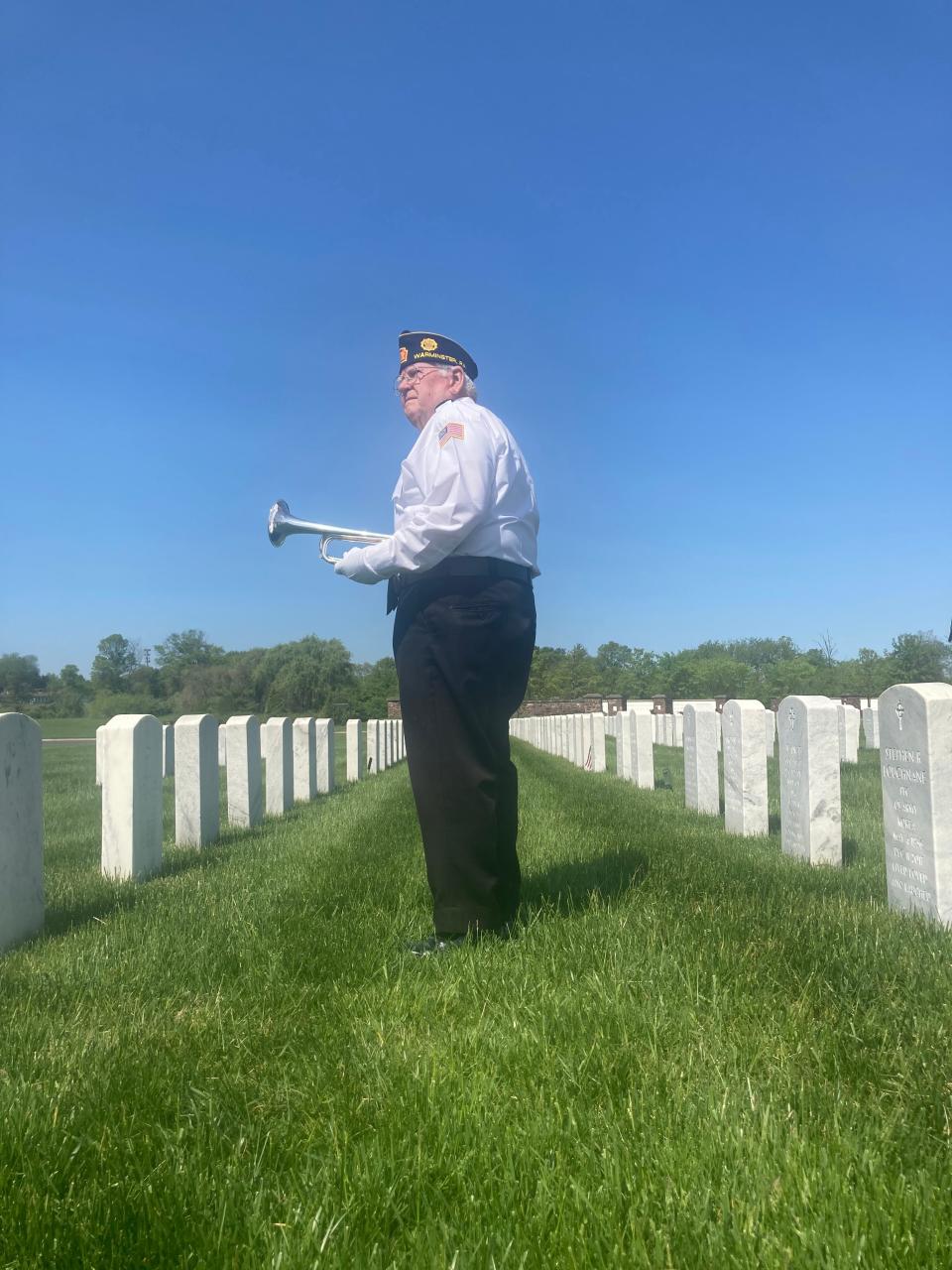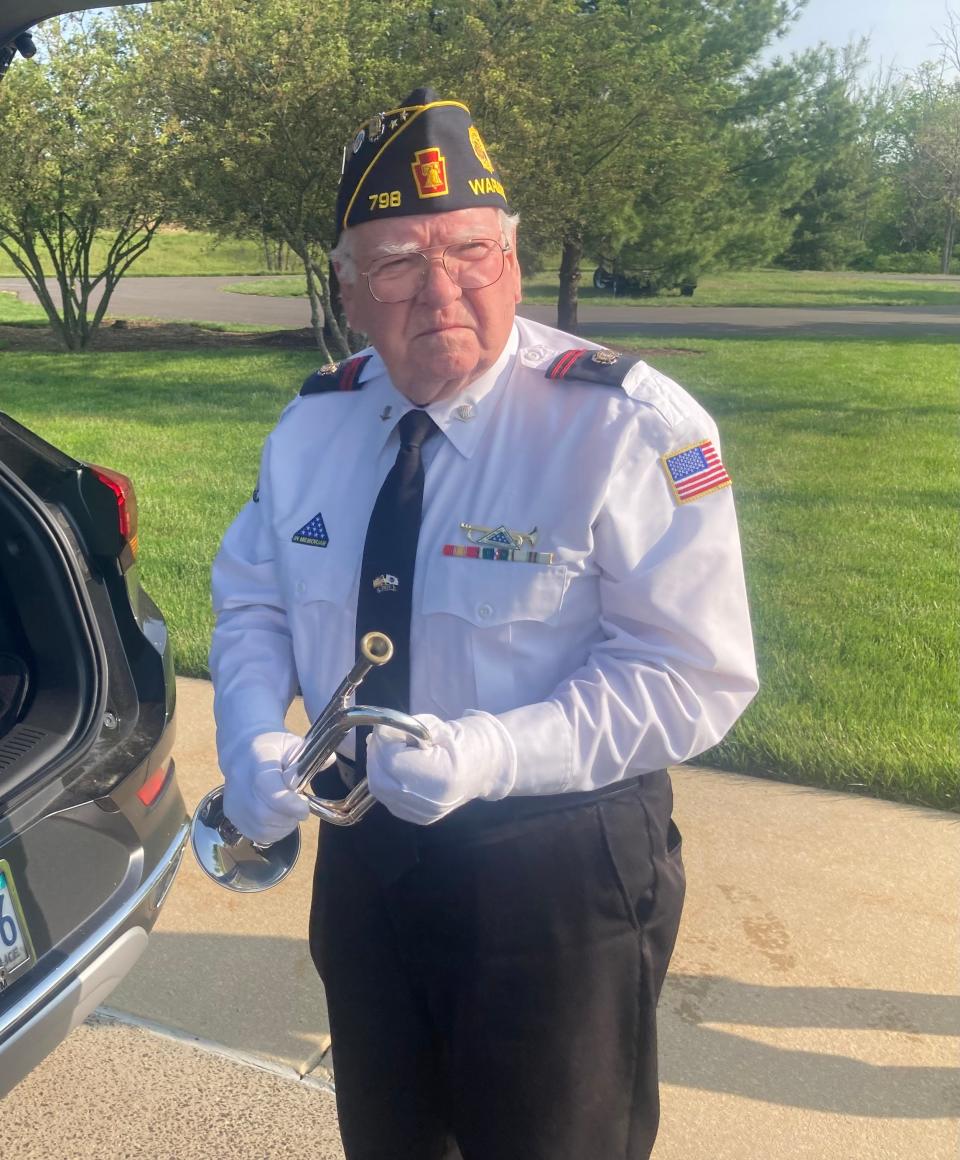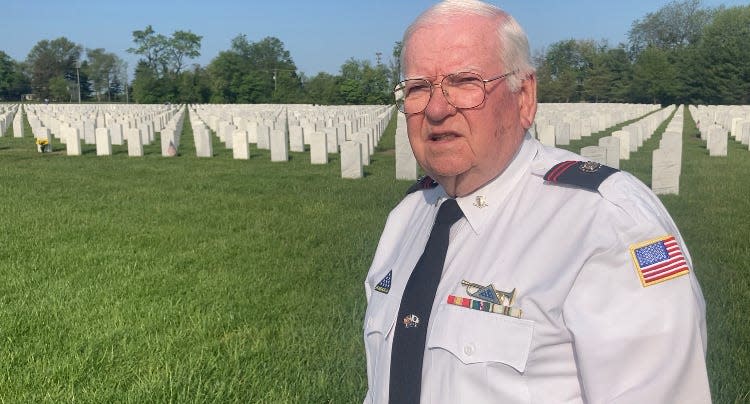At 83, his 'Taps' salute is 'final goodbye' at Washington Crossing National Cemetery
- Oops!Something went wrong.Please try again later.
The first veteran to be buried on a cloudless day at Washington Crossing National Cemetery was Alan Clark.
Jim McDevitt, 83, in uniform, readied his bugle, a polished silver-toned instrument, a replica of the type used for military funerals in World War I. He’d head to the columbarium, where Alan Clark would be interred. Clark’s was the first of seven burials that Wednesday at which McDevitt would sound “Taps.”
The cemetery was quiet. The sun warmed 15,000 identical white headstones, arrayed in precise rows on lush green lawn. Then, in the distance, came three muffled rifle volleys, followed by the melancholy tune. McDevitt played it flawlessly, which shouldn’t surprise. He’s played “Taps” more than 4,000 times at the National Cemetery, part of an honor guard that assures each veteran is given a dignified military sendoff.
“It’s the final goodbye,” he said, quietly, returning.

He looked back over the rows of white headstones. Then at his horn.
“By the end of the month I’ll hit 4,300,” he said. He has kept calendar logs of every funeral he has played since his first, which was on George Washington’s birthday, Feb. 22, 2013.
“I’m in my eleventh year. When I started, I thought, well, if I can do 500 funerals, I’m a happy man. I can sleep good at night knowing that I did that.”
He reached 500 fast, in a little over a year.
“They were burying them pretty quick when the cemetery opened,” he said.
He’s only missed bugler duty twice in that time, and only because he was with his daughter, who was having a procedure in a hospital.
“I don’t ever miss. I’m here, for the veterans, and for the families,” he said.

He started playing bugle by accident, at age 12. A friend who played drums, invited him to a practice session at the Rising Sun Drum and Bugle Corps in Philadelphia, where he grew up.
“I walked in the door and, of course, they’re looking for people to play, and I was handed a horn and they said, ‘Here, kid, make some noise with this.’ So I did.”
He found he had a natural talent.
“I picked it up pretty quick,” he said.
Within two years he was in a state championship drum and bugle corps for the Liberty Bell Cadets. When they broke up in 1957, he went to the Reilly Raiders, now in Willow Grove, where he still plays. He also plays horn for the Bracken Cavaliers in Bristol.
In 1959 he joined the Coast Guard, spent seven and half years on reserve duty. After that, he spent 10 years as a Philadelphia police officer, then had a second career working in the steel industry, from which he retired. All the time, he played his horn, landing his volunteer gig at the National Cemetery.
“I figure that, being a veteran, if I have the time and the talent, why would I not do this?” he said.

At first, he played only on Wednesdays, part of 60 active honor guard members divided into five teams at the cemetery. They fire the guns, fold the flag and present it to the family, and play “Taps,” once a lullaby tune that began to be played to signal the end of the day during the Civil War. It began to be sounded at military funerals in World War I.
As members left, or were ill, McDevitt substituted for other buglers and soon was playing throughout the week, occasionally at 10 funerals a day.
“So my numbers keep mounting,” he said. “By the end of the year, I’ll be at 5,000, if not before that.
“And, you know, it’s an honor. Every single time I play. It’s to honor the veteran, and it’s really the last thing we can do for the family.”
He excused himself. He was headed to another burial, one of seven he’d play that day.
Veterans' news What to know about the new George Washington statue at Crossing cemetery
Grief A crash, a death, a mystery in Levittown. What happened to Josh Louder?
JD Mullane can be reached at 215-949-5745 or at jmullane@couriertimes.com.
This article originally appeared on Bucks County Courier Times: Washington Crossing National Cemetery bugler honors dead with 'Taps'

